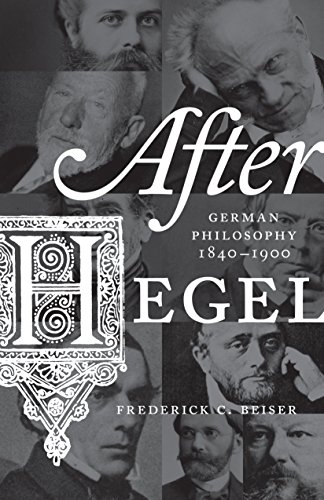
By Frederick C. Beiser
Histories of German philosophy within the 19th century quite often specialize in its first half—when Hegel, idealism, and Romanticism ruled. in contrast, the rest of the century, after Hegel's demise, has been fairly ignored since it has been obvious as a interval of stagnation and decline. yet Frederick Beiser argues that the second one 1/2 the century used to be in truth probably the most progressive classes in smooth philosophy as the nature of philosophy itself used to be up for grabs and the very absence of sure bet resulted in creativity and the beginning of a brand new period. during this leading edge concise historical past of German philosophy from 1840 to 1900, Beiser focuses now not on topics or person thinkers yet really at the period’s 5 nice debates: the identification challenge of philosophy, the materialism controversy, the tools and boundaries of background, the pessimism controversy, and the Ignorabimusstreit. Schopenhauer and Wilhelm Dilthey play vital roles in those controversies yet so do many ignored figures, together with Ludwig Büchner, Eugen Dühring, Eduard von Hartmann, Julius Fraunstaedt, Hermann Lotze, Adolf Trendelenburg, and ladies, Agnes Taubert and Olga Pluemacher, who've been thoroughly forgotten in histories of philosophy. the result's a wide-ranging, unique, and dazzling new account of German philosophy within the severe interval among Hegel and the 20 th century.
Read Online or Download After Hegel: German Philosophy, 1840–1900 PDF
Best modern philosophy books
Get The Relation to Oneself and the Other - Ethics in Michel PDF
Essay from the yr 2011 within the topic Philosophy - Philosophy of the current, Jawaharlal Nehru college (New Delhi), language: English, summary: within the later years of his existence, Foucault affiliates his genealogical reviews of discourse, associations and practices to the Kantian ‘ontology of ourselves,’ insisting that they, like Kantian ontology, are fascinated by whatever inside our found in order to begin swap from inside.
Andrea Franz's Der Glücksbegriff im Sadeschen Werk (German Edition) PDF
Studienarbeit aus dem Jahr 2006 im Fachbereich Philosophie - Philosophie des 17. und 18. Jahrhunderts, word: 1,0, Otto-Friedrich-Universität Bamberg (Institut für Philosophie), Sprache: Deutsch, summary: Marquis de Sades´ literarisches Werk wird im Folgenden nicht auf „Analverkehr“ reduziert. Vielmehr soll das Interesse des Lesers an der Welt des Marquis und seinen Schriften geweckt werden – eine Welt der Omnipotenzphantasie und Libertinage, die durch präzise historische Kenntnisse vergangener und gegenwärtiger Zeiten, pilosophiegeschichtliche Abhandlungen und gesellschaftliche Denkansätze überrascht, eben weil guy dieses breit gefächerte Wissen im Sadeschen Werk nicht vermutet.
Read e-book online Volume 8, Tome I: Kierkegaard's International Reception - PDF
Even supposing Kierkegaard's reception used to be in the beginning roughly constrained to Scandinavia, it has for a very long time now been a hugely foreign affair. As his writings have been translated into diverse languages his recognition unfold, and he turned learn a growing number of by way of humans more and more far away from his local Denmark.
Secondo l’autore, los angeles maggior parte dei filosofi del Novecento non si sono interessati alla questione della felicità perché più preoccupati dall’affrontare il sentimento che ha dominato il secolo scorso: il dolore, los angeles morte, l. a. guerra, l. a. distruzione, le persecuzioni. Noi contemporanei, fortemente influenzati da Schopenhauer, Hegel, Heidegger o Sartre, pensiamo che una filosofia tragica sia quella più in grado di esprimere lo spirito dei nostri tempi.
- Inside the Great Mirror: A Critical Examination of the Philosophy of Russell, Wittgenstein, and their Followers
- Schelling and Modern European Philosophy: An Introduction
- Understanding Phenomenology
- The Routledge Guidebook to Wittgenstein's Philosophical Investigations (The Routledge Guides to the Great Books)
- Caribbean Critique: Antillean Critical Theory from Toussaint to Glissant (Liverpool University Press - Contemporary French & Francophone Cultures)
- Sprache und Gewalt. Über die Handlungsmacht der Sprache bei Judith Butler (German Edition)
Extra info for After Hegel: German Philosophy, 1840–1900
Example text
After Hegel: German Philosophy, 1840–1900 by Frederick C. Beiser
by Charles
4.3



